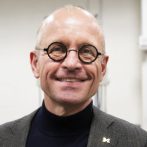
A new committee from the National Academies of Sciences Engineering and Medicine has been formed entitled, Carbon Utilization Infrastructure, Markets, Research and Development. DTE Energy Professor of Advanced Energy Research and Director of the Global CO2 Initiative, Volker Sick, has been announced as a member of this committee.
The committee is made up of 14 members who are tasked with providing insights into markets, infrastructure and research needs to create a circular-carbon economy as part of the country’s carbon neutrality goal. The framework of a circular-carbon economy is a closed loop where carbon can be continuously captured from the atmosphere, reused, and when it is released into the atmosphere again it can be recaptured to start the cycle over again.
“We expect to provide background information and recommendations to decision-makers that will enable a rapid deployment of using CO2 as a resource for carbon-based products to move towards a fossil-free carbon economy,” said Sick.
For years now we have been hearing how carbon emissions are our biggest challenge in addressing climate change and have pushed for industries, businesses, and governments to make changes to reduce the carbon output. Sick and his work at the University of Michigan’s Global CO2 Initiative shows how we can change the way we look at CO2 emissions and start using them as a resource now to create a circular life-cycle instead of just creating more of the problem.
“We must stop treating the atmosphere as a ‘landfill’ into which we release new carbon from fossil resources that then accumulates in the air as CO2,” said Sick.
Petroleum is the fossil carbon-based source for fuels that are used for fueling our vehicles, planes, and even for manufacturing everyday products like concrete, footballs, yoga pants, and sunglasses. Instead of continuing to drill for this resource and creating more of a problem, Sick and the committee’s goal is to show how capturing CO2 from the air and reusing it can be beneficial in multiple ways.
“For many of our daily-life products carbon is a necessary component that most often will end up as CO2 in the atmosphere. If we stop taking this carbon from fossil sources, we stop adding new CO2 to the atmosphere. While the carbon will eventually be released again when these products are being used, it can then be recaptured and be used again and the net effect will be carbon neutral,” explained Sick.
This committee will first work to assess the current state of infrastructure for CO2 transportation, use, and storage and then assess which opportunities for development and expansion are a priority. Later they will move on to identifying markets, commercialization, and development of a circular carbon economy.
